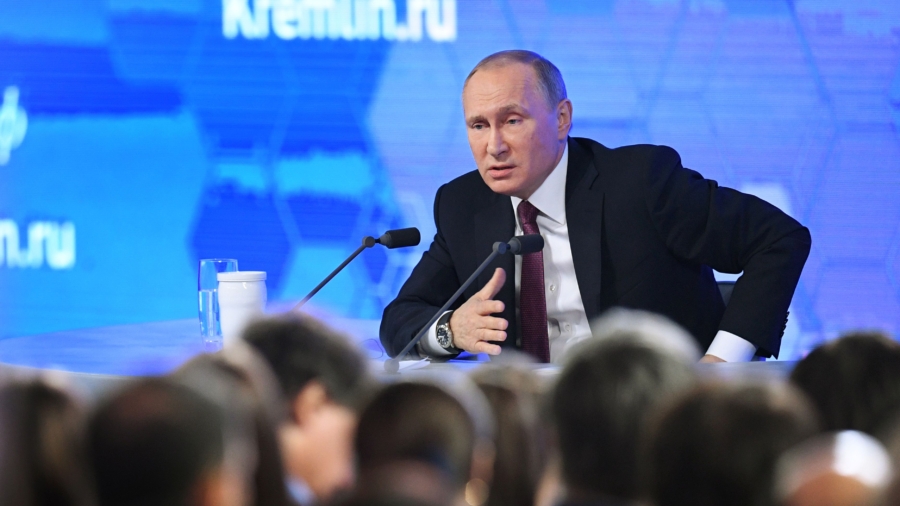In a four-hour Q&A session, Russian President Vladimir Putin spoke on Dec. 23 before an audience of about 1,400 foreign and Russian journalists invited to the occasion in Moscow. It’s the 15th such annual conference the strongman leader has held.
Putin answered questions covering a wide range of topics, including widespread allegations that Russian hackers and media had meddled with the 2016 US election.
Other salient issues were subjects like modernization of Russia’s military and infrastructure, the civil war in Syria, and domestic concerns such as corruption.
Democrats are ‘sore losers’
Accusations that US President-elect Donald Trump’s victory was in part due to Russian hackers have featured heavily in legacy western media. Putin rebuked this, saying that the opposing Democratic Party was responsible for its defeat.
“Losers always look for ways to accuse someone else,” Putin said of the Democratic Party, whose candidate Hillary Clinton lost the US presidential race to the Republican Donald Trump. When asked why he enjoys support among US conservatives, the Russian leader said it was because “they are people who share our traditional values.”
Both Putin and Trump have rallied support around nationalist causes, though the St. Petersburg-born Soviet, then Russian secret policeman by career has been in power for 16 years. That’s the length of four US presidential terms.
On Dec. 23, Trump made public a congratulatory Christmas and New Year letter from Putin, while the Russia president said he would, at American invitation, be willing to visit the US.
Aleppo
Relations between Russia, European nations, and the US have been poor, with warfare in regions like eastern Ukraine and Syria echoing the proxy conflicts of the Cold War.
In particular, the recent murder of Russia’s ambassador to Turkey, Andrey Karlov, by a policeman and radical Islamist highlights the gravity that the civil war in Syria has in international relations.

The war began in 2012 and is being fought between the army of the Syrian government (a long-time Russian ally) and a variety of opposition forces, including the much-reviled Islamic State. During President Barack Obama’s time in office, the US has protested Russia’s military assistance to Syria.
Fire support from the Russian air force and naval presence was instrumental in helping government troops fight to victory in the rebel-held city of Aleppo, but at the cost of thousands of civilian deaths. Russian and Western diplomats are active in negotiating ceasefire terms.
Putin did not address these humanitarian concerns, but said that Russia had helped negotiate the evacuation of tens of thousands of people from the city.
Putin stated that 70 percent of the Russian military was now up to modern standards, emphasizing efforts to break with stereotypes of a huge but technically or professionally inferior fighting force. Russian media have recently announced the planned commissioning of new nuclear-powered submarines for 2017.

Where is Russia headed?
Addressing a question from the Chinese state-run CCTV, Putin confirmed the nation’s status as a strong strategic partner of China, as the two former Cold War rivals now cooperate on a number of major military, space, infrastructure, and nuclear energy projects.
Russia’s economy is heavily dependent on resources such as petroleum and natural gas, and corruption as well as Western sanctions over the Ukrainian conflict drag it down.
“We have a ‘common position’ on many international questions. This is a stabilizing force in global affairs,” wrote a journalist from Great Britain’s Guardian reporting Putin’s words on China.

Many journalists from state-friendly or state-controlled Russian media asked Putin questions that amounted to little more than flattery or chances for the president to make positive statements, various publications noted.
The Russian leader brushed off questions from Echo, a liberal-leaning Moscow radio station, about corruption and power plays in the Kremlin, saying that the recent removal and arrest of an economic minister Ulyukaev was in accordance with the evidence.
Putin declined to confirm whether he would stand for reelection in 2018, saying that it was too early to tell.
As the conference dragged into its latter half, the questions became more frivolous. “The later stages of Putin’s press conferences can go anywhere, frankly,” Luke Harding of the Guardian reported. One journalist queried Putin about a deadly tragedy in Siberia involving homemade but poisonous alcohol; another asked Putin his views on love.
“Love quickly turns to hate,” the Russian president answered her.
(NTD Television)

